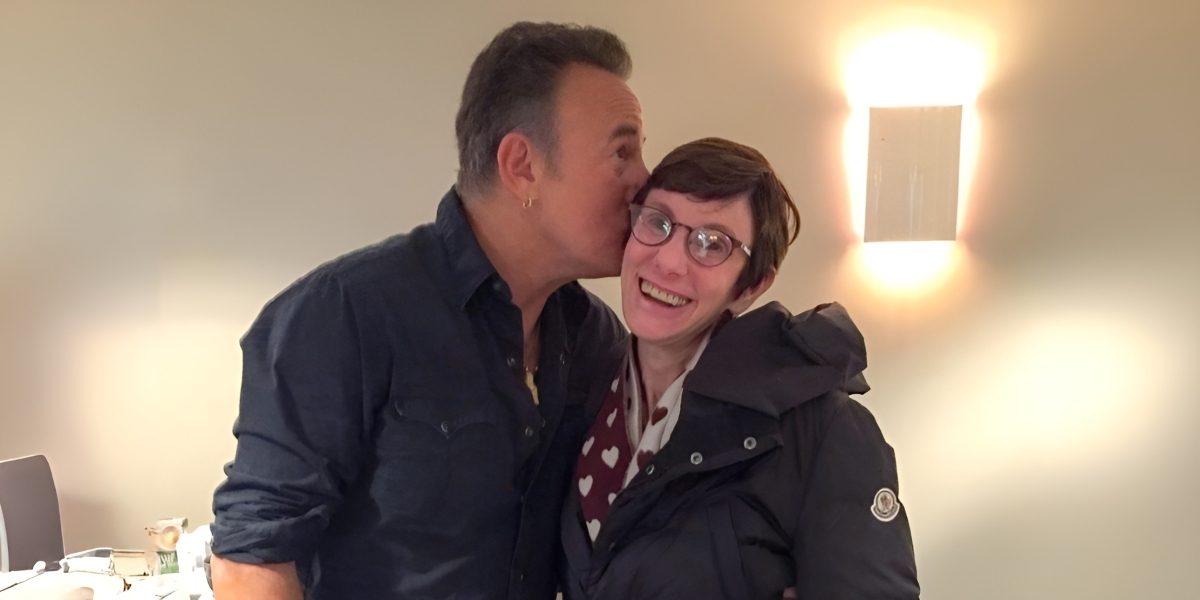By: Clara Whitmore
In High Hopes: A Memoir, author Anne Abel chronicles not just her global journey following Bruce Springsteen’s world tours, but the deeply personal trials, transformations, and unexpected encounters that shaped her life along the way. Speaking candidly, Abel shares moments of turbulence in the classroom, brushes with music industry legends, and one profound conversation that altered her perspective on family, love, and loss.
Chaos in the Classroom
Before her memoir took shape, Abel spent years teaching developmental English, freshman composition, and creative writing at the Community College of Philadelphia. Though teaching had its rewards, her last semester revealed the darker, more volatile side of the profession.
Class sizes were full, but student engagement was scarce. “Of the 25 students, exactly four did the homework. Of those four, only one got it right,” she recalls. Frustration quickly boiled over into hostility. One student, Robert, routinely hurled desks at her in protest over seating. Another demanded she change his grade, insisting the dictionary was wrong.
When Abel sought help from administration, the response was chilling in its indifference. She was advised to file detailed behavior reports or call security using a beige classroom phone. After filing reports, she overheard students plotting revenge, gleefully anticipating judiciary hearings where they could “take her down.”
The situation escalated when a veteran student erupted in class, cursing and looming over her menacingly. In that moment, Abel reached for the classroom phone, but it failed. “Every student was staring at me, watching a reality television show better than they had ever seen,” she remembers. The breaking point came when Robert once again hurled a desk, punctuating weeks of hostility, fear, and disruption.
“I am not easily scared,” Abel says. “But after this last angry, violent class, and no support from the administration as if it were par for the course, I decided I deserved better.” Walking away from teaching wasn’t just an act of self-preservation; it was a recognition that her energy and talents could be spent in spaces where safety and dignity were not negotiable.
An Unexpected Encounter in Adelaide
If the classroom marked a period of despair, Australia marked the beginning of a new chapter. While following Springsteen’s tour abroad, Abel found herself outside a hotel in Adelaide, mingling with other fans. There she met Barbara Carr—Bruce Springsteen’s longtime manager of 35 years.
The conversation began innocently, with compliments about Carr’s dress and talk of grandchildren. Abel suspected Carr was connected to the band but resisted asking outright. “If I did, the conversation would be over: she would be someone important and I would not be. End of story.”
Only later, after Carr revealed her identity, did Abel realize the depth of the connection. Carr, along with her husband, writer Dave Marsh, had endured the devastating loss of their daughter decades earlier. That loss had inspired them to launch a foundation, supported by Springsteen, to fund cancer research.
A Transformation in Perspective
The meeting with Carr resonated with Abel beyond fandom or serendipity. At the time, she was grappling with a painful dilemma: whether to sever ties with her eldest son, whose marriage had brought her years of abuse and alienation. Estranged and exhausted, she wondered if cutting off contact might be the lesser evil.
Then fate intervened. Days later, Abel encountered Carr again in a hotel dining room. This time, she spoke directly: “Barbara, I read about your daughter and I am so sorry.” Carr responded with raw honesty: “It happened 21 years ago but it feels like it happened last month.” She spoke openly about grief, about the permanence of loss, and about carrying memory forward with love.
That exchange changed everything for Abel. “As I walked away towards the fitness center, I knew immediately that I could never willfully break off with my son,” she reflects. “It would be disrespectful to people like Barbara who did not have a choice in these matters.”
In that moment, the personal became universal. Abel realized that while reconciliation with her son might remain fraught, choosing hope—even fragile, uncertain hope—was itself an act of resilience.
Finding Meaning in the Journey
High Hopes is more than a travelogue or a fan memoir. It is the story of a woman who confronted darkness in her professional life, found unexpected light in conversations with strangers, and learned to reframe heartbreak into something bearable.
Her narrative is textured with contrasts: the chaos of an American classroom against the serenity of an Australian morning; the hostility of disengaged students against the kindness of a legendary manager sharing her pain; the temptation to give up against the resolve to keep trying.
What makes Abel’s story compelling is not just the experiences she recounts, but the honesty with which she tells them. Her voice is unsentimental yet deeply humane, acknowledging both the absurdities and the agonies of her journey.
In the end, Abel’s memoir lives up to its title. To carry “high hopes” is not to deny hardship—it is to continue forward despite it, to find connection even in unlikely places, and to honor love even when it is complicated.






